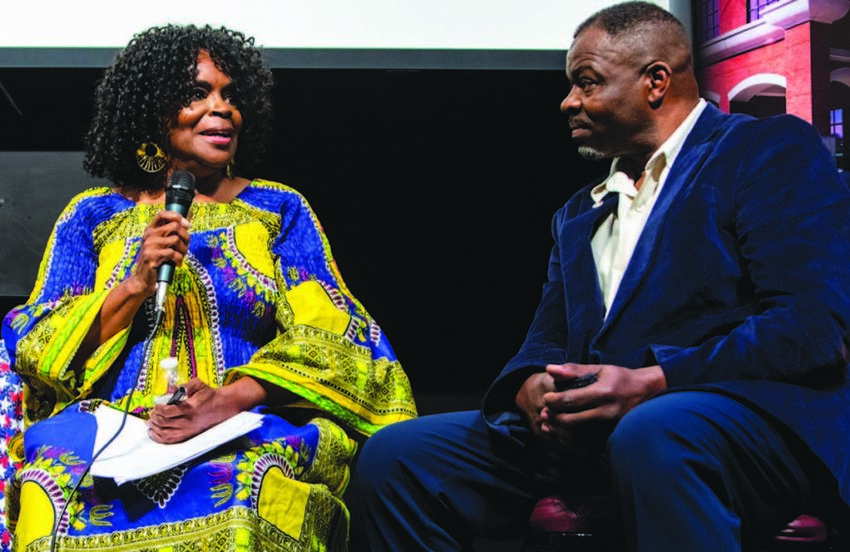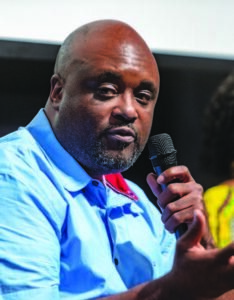 Sage Chimona (left) and her cousin Solomon Titus Taylor (right) are the descendants of former slave and American Revolutionary War soldier Ishmael Titus. Photo by Ivan Saul Cutler/Carolina Peacemaker.
Sage Chimona (left) and her cousin Solomon Titus Taylor (right) are the descendants of former slave and American Revolutionary War soldier Ishmael Titus. Photo by Ivan Saul Cutler/Carolina Peacemaker.On a sunny day in May 2021, the descendant of a Black patriot and the descendant of a White Revolutionary War leader and politician met at the Nathaniel Greene statue at the Guilford Courthouse National Military Park. The two shared family stories, reflected on the past and blessed the land for the future.
Sage Chioma, is the descendent of patriot and former slave, Ishmael Titus, who fought at the Battle of Guilford Courthouse in 1781. Her meeting with Joanna Winston Foley, a descendant of Joseph Winston, the Revolutionary War hero whom Winston-Salem is named for, was the culmination of years of genealogical and historical research by Chioma and her family.
 Ernest Hooker, an instructor of Military History at N.C. A&T State University. Photo by Ivan Saul Cutler/Carolina Peacemaker.
Ernest Hooker, an instructor of Military History at N.C. A&T State University. Photo by Ivan Saul Cutler/Carolina Peacemaker.On Thursday, April 27, at the Guilford Courthouse National Military Park Visitor Center, Chioma and her cousin, Solomon Titus Taylor, shared with the community how they began finding all the history that would lead them to their ancestor’s past. The cousins discovered that their ancestor was part of the little-known history of Black Patriots who took part in the Battle of Guilford Courthouse.
This panel discussion was a collaboration between Greensboro Public Library, the Greensboro History Museum, and the National Park Service. Scott Culclasure, author of A Guide to the Monuments, Guilford Courthouse National Military Park, opened the event with an overview of the battle and the site’s history. Established on March 2, 1917, Guilford Courthouse National Military Park was the first Revolutionary War battlefield protected by the federal government. The Battle of Guilford Courthouse was fought on March 15, 1781.
Ishmael Titus was born in Virginia in the 1740s. Documents found by Taylor showed that Titus was sold as a slave at least three times before he became a soldier. Titus fought in the battles of King’s Mountain, Guilford Courthouse, and Deep River during the American Revolutionary War. After the war, he migrated north and went on to live as a free man and died at the age of 110 in Boston, Massachusetts.
Taylor was born in Rochester, N.Y. and served in the U.S. Marine Corps with 16 ½ years of active-duty service and seven years in the reserves. Taylor’s grandfather passed down stories of his life, where he grew up and stories of other family members, which was the initial start of Taylor’s journey to discovering his roots.
“History to me is the Titus lineage that was scattered all across America,” said Taylor. “The history is there; you just have to look for it. I made a vow to myself, that all the stories of my family must and have to be told, for future generations.”
Taylor was able to find documentation of Titus lineage tracing back to 1812. Titus was one of 12 children, and Taylor has since found the familial branches of six siblings. Taylor’s research also led him to finding his cousin Sage Chioma, whom he had never met before. His grandfather was Chioma’s great grandfather’s brother.
“I have been able to travel and meet so many family members who were also looking for us. It has been a pleasure and honor to find this history,” said Taylor.
Chioma, a Community Health Educator, specializing in addiction and substance abuse prevention and a longtime resident of Guilford County since she relocated from New York in 2004, shared that she also never knew of her ancestral connection to the area until about 2019.
“I’ve walked this park many times. I graduated from Guilford College. But I never knew that I had a connection to this park,” she said.
Chioma explained that part of the family’s research includes finding the burial site of Titus but has proved to be a challenge. Due to mass gravesites of slaves in North America without markers and the impact of the Great Migration of former slaves from the South, the family has been met with challenges of finding documentation along the journey. To this day, the Titus family is still searching for Ishmael’s burial site and has accepted the help of the history department at Williams College in Massachusetts.
“The storytelling and the passing of traditions are extremely important for African American lineage because so much of our history is hidden. From gravesites that have no markers, to the Great Migration of African Americans from the South into the cities – it’s not as easy as it is as it is for someone like Joanna, who knows where her ancestor is buried, and she can walk you right to the monument,” said Chioma.
Panelist Ernest Hooker, African American and Military History instructor at North Carolina A&T State University added that male slaves, who joined the militia at that time were not soldiers trained for war; rather, they were skilled tradespeople such as farmers, blacksmiths, and carpenters. Male slaves were also used to serve as substitutions for their slaveholders in exchange of the promise of freedom and were listed under the slaveholder’s name.
In many cases, slaveholders did not uphold their end of the deal after the war and Black soldiers were forced to either reluctantly return to slavery or choose to flee. Such is the story of Edward “Ned” Griffin, who served as a substitution at the Battle of Guilford Courthouse for slaveowner William Kitchin. Griffin was honorably discharged from service in July 1782, but it took until 1784 before the North Carolina General Assembly finally upheld the agreement and granted Griffin his freedom.
“Thousands of slave soldiers were used as substitutions and many had no choice,” Hooker said. “And because they served as substitutions, many of their names were not added to the military muster rolls. So, there would be no documentation or proof that they had honorably served their country.”
Black soldiers were also denied their military pensions because there was either no record of them serving or after they were discharged, soldiers may have misplaced their paperwork. Titus was one of many who never received their pension before they died, despite the numerous attempts at petitioning the Massachusetts state government.
Arthur Erickson, the government documents librarian at the Greensboro Public Library in Genealogical Research advised people doing research on their family history to start with public records like wills, land deeds, marriage certificates, and newspaper clippings.
Outside of special events, visitors to the 250-acre park may explore the 2 ¼-mile, self-guided automobile tour, hike nearly four miles of foot trails, view more than 170,000 artifacts at the park’s visitor center and participate in interpretive programs, which helps tell the story of the American Revolution.
It’s been documented that some 5,000 Black men who were slaves fought in the Revolutionary War. So far, at the Battle of Guilford Courthouse, 33 Black soldiers have been identified as participants.
For more information, visit the park’s website at www.nps.gov/guco.com.